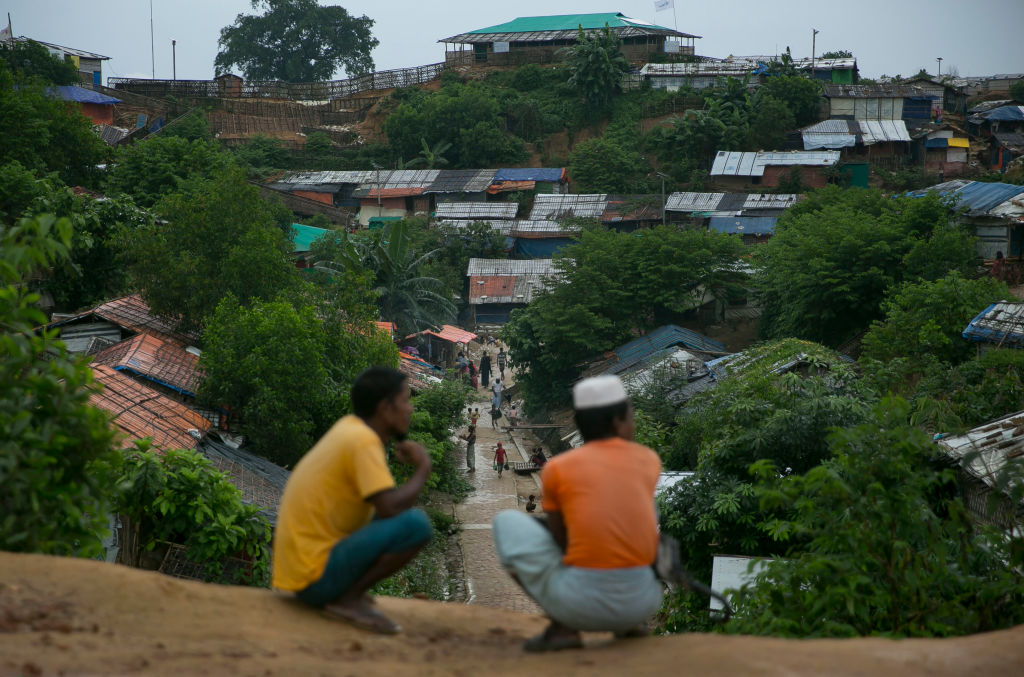
In the largest refugee settlement on earth we are holding our breath.
On March 24, Cox’s Bazar, Bangladesh confirmed a COVID-19 case. It’s now just a matter of time before the outbreak reaches the nearby camps, where hundreds of thousands of Rohinyga refugees like myself are living.
Having already endured a brutal military crackdown and displacement from our homes in Myanmar, we now face the prospect of further, protracted devastation.
A vaccine does not yet exist and could take a year or more to become available, meaning that the scourge of COVID-19 could circulate in the bustling confines of the camps for months.
Social distancing, self-isolation and quarantine are fantasies for Rohingya refugees like me. My family of seven lives inside a 5-meter (16-foot) tarpaulin structure. Such flimsy shelters are the norm in the camps here, which have an average density of more than 100,000 people per square mile.
What makes matters worse is that we rely on aid for survival. People here do not have access to income, and so cannot afford the most basic materials needed to prevent the spread of coronavirus, such as face masks and soap. In the camps, dozens of people share a hand-pump and toilet. Hygiene is a luxury.
Bangladesh, which has recorded 56 cases of the virus and six deaths throughout the country, has imposed a lockdown on Cox’s Bazar, including on the camps.
Rumors are spreading and panic is growing. One night last week, my camp was alive with noise and anxiety. Prayers were chanted at midnight as the Imams and people sought God’s protection.
The coronavirus has overwhelmed the well-equipped health systems of wealthy Western and Asian countries. Bangladesh, one of the poorest countries in the world, has no chance of mounting a better response to an outbreak among the 860,000 Rohingya refugees in Cox’s Bazar.
Local health experts say there are no ventilators in Cox’s Bazar and no capacity for intensive medical care in the camps. While the government of Bangladesh has said that the Rohingya will be given access to government medical facilities if needed, it is unclear what criteria will be used to qualify for this access, or how patients will be transported or quarantined.
Should someone fall ill with symptoms of the coronavirus, it’s unclear where we can even take the patient. There appears to be no place that has arranged testing within the camps.
Cox’s Bazar-based aid agencies are doing what they can to prevent or delay an outbreak in the camps. But many facilities and services have been temporarily closed. Medical charities that run clinics inside camps are short on equipment. It is clear they will be quickly overwhelmed when the virus hits.
What makes matters even worse is that last year the government cut off the internet and confiscated sim cards in the camps. To protect ourselves amid this pandemic, we need access to news and health websites. We need to be able to share information with friends and family via social media. Yet we are deprived of even this small lifeline.
Human Rights Watch has been urging Bangladesh to lift the internet shutdown, “which is obstructing crucial information about symptoms and prevention, or end up risking the lives of refugees, host communities, and healthcare workers.”
The telecommunications restrictions mean that many Rohingya refugees cannot even call the helpline that has been set up by the government.
Our situation is already desperate. And that is before the virus sweeps through the camps.
I am mindful of the suffering that may await not only us, but all of the communities of displaced or vulnerable people, including those in Venezuela, South Sudan, Yemen and Syria.
All of us are sitting ducks and utterly dependent on outside help for survival. The international community can make a huge difference to our lives by providing whatever they can to help us at least face this crisis with dignity. We need healthcare, hygiene facilities, testing kits and medicine. We need Bangladesh to lift the telecommunications blackout.
The Rohingya spirit is strong; we have overcome so much. We will continue to fight for our rights in Myanmar and in Bangladesh. But for now, we are once again faced with a battle for survival itself. We implore the world to listen to our cries for help.
Please send tips, leads, and stories from the frontlines to virus@time.com.
More Must-Reads From TIME
- The 100 Most Influential People of 2024
- Coco Gauff Is Playing for Herself Now
- Scenes From Pro-Palestinian Encampments Across U.S. Universities
- 6 Compliments That Land Every Time
- If You're Dating Right Now , You're Brave: Column
- The AI That Could Heal a Divided Internet
- Fallout Is a Brilliant Model for the Future of Video Game Adaptations
- Want Weekly Recs on What to Watch, Read, and More? Sign Up for Worth Your Time
Contact us at letters@time.com